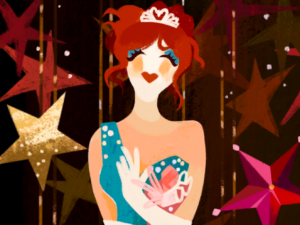The concert hall was freezing. It was Sept. 10, the second show of the free American Roots Concert Series at Eastern Market’s Hill Center. The concert, originally scheduled for the Center’s gorgeous outdoor pavilion, was moved indoors because of rain. Instruments, sound equipment, and foldable chairs were hastily carried into a much smaller space. In a futile attempt to battle the moisture, the air conditioning blasted. It wasn’t the place for a bluegrass concert.
Then the band started playing. Within ten seconds, a little girl—no more than six, sporting overalls and an unruly mop of brown hair—walked to the front of the room, head held high, and began to dance.
Her father jumped up, trying to coax her back into her seat. She gestured at the crowd, confusion on her face. Her unspoken question was clear: why isn’t anyone dancing? The adults, chuckling but encouraged, began to sway in their seats. They didn’t stop for the rest of the show.
Twisted Pine prides itself on its ability to turn crowds into communities. The band—composed of fiddler and lead vocalist Kathleen Parks, mandolinist Dan Bui, bassist Chris Sartori, and Anh Phung on flute—knows that kinship lies at the heart of their music.
As for what kind of music that is, the jury’s still out. On Bui’s battered mandolin case, a sticker reads “FOLK” in bold letters, giving one answer. But that isn’t quite right.
Twisted Pine seems equal parts folk, pop, jazz, and funk. One of the first songs in their set, “Papaya,” feels nothing like a traditional bluegrass tune. The bassline’s heavy, the rhythm’s groovy. While performing it, the whole band couldn’t help but rock in sync.
Their eclecticism is largely due to the band’s refusal to impose limits on their music. “We don’t think about what [genre] it is when we’re recording or writing,” Sartori said, chuckling, in an interview with the Voice. “We just start with an openness and that informs where things go.”
Often, they go places most bluegrass bands would never think to go. Halfway into their set, the quartet performed the Rolling Stones’s “Dead Flowers,” complete with percussive mandolin bursts, a gravelly bass riff, and Sartori’s affected Southern accent. In a brilliant stylistic move, Parks stuttered her vocals in the tradition of icons like Talking Heads’s David Byrne and the Who’s Roger Daltrey. With a fiddle, a mandolin, an upright bass, and a flute, Twisted Pine tapped into pure rock ’n’ roll.
They performed other covers, too. Some, like a jamming rendering of Bob Marley’s “Could You Be Loved,” continued to display their virtuosic talent for genre-bending. But their renditions of bluegrass classics, like Bill Monroe’s “The One I Love Is Gone”—first performed by trailblazers Hazel Dickens and Alice Foster—did something more profound.
At the most basic level, Twisted Pine said they simply love the bluegrass canon and want to share it with the world. “The people have to know!” Sartori said.
But that’s not to say they perform these songs by rote; they always add their own flare. Halfway through “The One I Love Is Gone,” its smooth and syrupy tempo ratchets up, each instrument hurtling full force into an epic finale that brings down the house.
That’s another thing about Twisted Pine: they couldn’t perform a single song without inspiring listeners to erupt in applause halfway through. Even to avid fans, every verse—every riff—feels fresh. There’s a sense, throughout their performance, that the band thrives in the unexpected.
Twisted Pine’s song “Right Now” epitomizes that instinct. “That song has had, since we recorded, the most dramatic shift—in how we play it, how we sing it,” Parks said.
Originally recorded as an airy three-minute pop ballad, when performed live, “Right Now” became something altogether new. It more than doubled in length, largely from a showstopping bass solo, Sartori’s best performance of the night. The mandolin, fiddle, and flute roughen up, giving the song a harsher texture underneath Park’s ethereal vocals.
The moment the bass jumps into its solo, Sartori—who normally holds a focused frown while playing—broke out into an ear-to-ear grin. His eyes shifted around to his bandmates, each jamming out in their own right. In that moment, it became clear why they’d devoted their lives to music.
After the show, a staff member called out: “Make sure to buy merch! It’s what pays for these shows.” The audience cheered in approval, but most didn’t make their way over to the table.
When asked what they’d been losing sleep over, the band collectively sighed.
“I always sort of joke that the only constant in our economy is how much musicians are getting paid,” Sartori said, a self-deprecating smile on his face. Phung added, “My rent is so much more than what it was 10 years ago. But I’m getting paid exactly the same.”
Twisted Pine, like many other up-and-coming bands, occupies a tenuous position: they’re releasing music at a time when streaming services pay them pennies for millions of clicks. The model privileges the already-famous, and makes it difficult for young artists to stay afloat. Add “the rising cost of doing anything right now,” Sartori points out, and the picture becomes even worse.
But Twisted Pine is still playing. They still agreed to perform a free show to a room full of strangers, in a much smaller, colder room than they’d expected, because they love what their music can do.
“Sometimes I think about the point of pursuing music as a career,” Bui said. “Like, what are you contributing to the world compared to a nurse or a social worker?” He paused, and the corners of his mouth tipped up in an earnest smile. “Music gives communities a reason to come together and gather.”
A room full of applause for a four-part harmony. Singing strangers, brought together in that moment to belt out the chorus to a Bob Marley song. A little girl in overalls, dancing because you’re supposed to dance.




